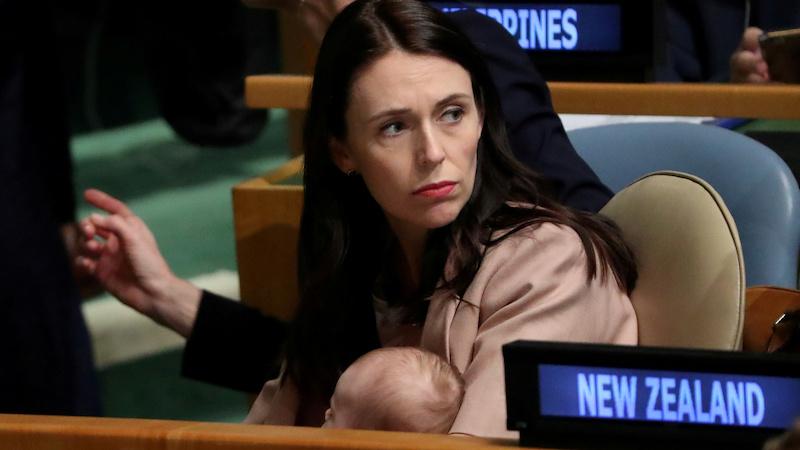New Zealand’s prime minister is a rock star on the world stage. At home, supporters are impatient.
New Zealand Prime Minister Jacinda Ardern holds her baby Neve in the General Assembly Hall at the Nelson Mandela Peace Summit during the 73rd United Nations General Assembly in New York.
Jacinda Ardern squares up her first year in office this week with a lead over her rivals as the latest polls finally catch up to her celebrity status overseas, but supporters in New Zealand are growing impatient with the pace of change.
Missteps by the scandal-tainted opposition National Party, rather than the prime minister’s own successes, have boosted her Labour Party three percent over the last poll, allowing it to pull ahead of its rival for the first time since 2017 elections.
And the 38-year-old leader’s biggest challenge is imminent: striking a tricky pay deal in talks with emboldened unions as business confidence hovers at its lowest in nearly a decade, threatening the growth outlook.
“Those unions will push very hard,” said Richard Shaw, an expert on New Zealand’s government and politics at Massey University.
“If that tips over into what is perceived to be financially or economically unsustainable wage settlements then that becomes a real problem.”
Ardern’s slowness in delivering on campaign promises, particularly tackling high levels of income inequality, frustrates domestic supporters in contrast with the global euphoria around her that peaked last month.
An appearance at the United Nations with her newborn daughter and her partner drew headlines that gave New Zealanders a sense she would punch above her weight internationally and promote a free trade agenda to benefit an open economy.
“She champions women rights, lesbian, gay, bisexual and transgender rights and stands up to the world’s bullies and makes sure the little guys have a voice as well,” said information technology student Timothy Hills.
“And the fact that she’s doing it with her baby in her arms is impressive.”
Ardern rocketed to global celebrity as an inspiration for women after her unexpected 2017 election win and became only the second leader to give birth while in office since Pakistan’s Benazir Bhutto.
The lead in Tuesday’s 1 NEWS Colmar Brunton poll was largely attributed to internal accusations of corruption and sexual harassment in the National Party. Yet it reflects strong support for the party, a spokesman said, while calling the past fortnight “incredibly difficult.”
Make or break
At home, although she has lifted the minimum wage and boosted benefits for poor families, Ardern has faced strikes by primary school teachers, nurses and bus drivers.
“We are cognizant of the cost of living for New Zealanders, which is why the first thing we did when we came into government was improve the incomes of low- and middle-income families,” she told parliament on Wednesday.
She listed government achievements ranging from an extension of paid parental leave to halts on foreigners buying existing homes and the issue of new offshore energy permits.
But analysts fault her for pulling her punches and making slow progress.
“Ardern came in promising this would be a transformative government,” said political commentator Bryce Edwards of Victoria University in Wellington.
“She has certainly moved government to the left, but they have made no important changes.”
The foreign home buyers’ ban took effect this week in watered-down form, for example. And though Ardern backs climate change efforts, New Zealand is locked into exploration deals with oil firms, while key polluter farming is crucial for its economy.
Although the economy posted its strongest growth in two years in the second quarter, that was supported by good farming weather, and the outlook remains tricky.
Surveys of manufacturing and services reveal some at their lowest performance since the global financial crisis and fuel prices are pushing up inflation.
“If things go increasingly pear-shaped then our economy will suffer and she will pay the price for that,” said Shaw, the Massey University expert.
